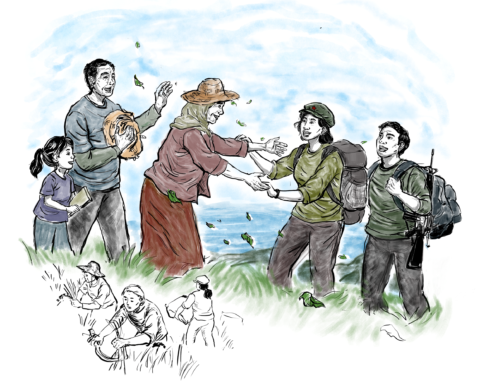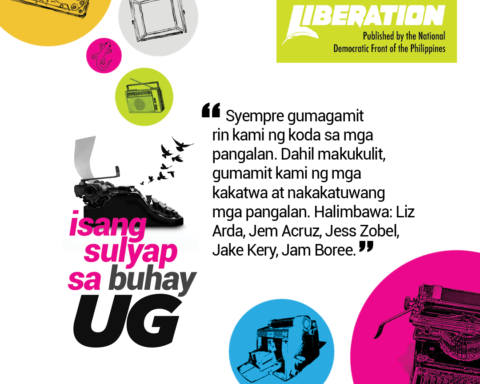by Pat Gambao
Revolution strikes chords in the state military
Many young men and women, imbued with a keen sense of nationalism and patriotism, had chosen a military career where they believed they could best serve the country and the people.
But as they uncovered the true nature of the military establishment in the semi-colonial, semi-feudal character of the Philippine society, as they witnessed how US imperialism and its local cohorts of big comprador and landlord class used the military as an instrument to preserve their rule and protect their interests, disillusionment sets in.
However, this was not enough to dampen their aspirations and weaken their conviction. Many junior officers and soldiers have continued to hold on to their ideals and principles, and to the noble mission to defend the country and serve the people in varied ways.
A prime example is Dante C. Simbulan, former professor at the Philippine Military Academy (PMA), political prisoner of the Marcos dictatorship, author of books, and a political activist till now in his late 80s.
A member of PMA Class 1952, Simbulan was an intelligence officer and Philippine Army combatant going after communist rebels. However, it did not take long for the military service was so serious about proved to be a great disappointment for him.
He observed, in not a few instances, military officers unfairly treating ordinary soldiers. He detected the alienation of the military from the people it was supposed to serve and protect, the racial discrimination by Americans towards Filipino soldiers, the PMA being a copy of the West Point in New York rendering its graduates virtual puppets of imperialism. He also realized how a handful of the ruling class controls and dominates Philippine politics and the economy to the detriment of the mass majority.
Eventually, he opted to discontinue his field service and turned to teaching at the military academy. He taught history and nationalism. His main concern was to develop cadets who, after graduation, would not become instruments of the ruling system in exploiting and oppressing the people. His progressive teachings and political activism caused his incarceration, without charges filed against him, for three years during the Marcos martial-law regime.
In 1980, Simbulan went on self-exile in the United States and continued to campaign for ending US support to the Marcos dictatorship and for the closure of the American military bases in the Philippines. He remained in the US even after the ouster of Marcos, but remained in touch with the open mass movement in the country and issue relevant statements when so requested.
Simbulan has written two books related to his brief military career and his political awakening. One is titled, Whose Side Are We On? (Memoirs of a PMAer) and the other is titled When the Rains Come, Will Not the Grass Grow Again? (The Socialist Movement in the Philippines: 1920-1960).
In the introduction of the first book, Simbulan wrote: “I found myself engaged in a serious study of who we really are. What is our real role in this scheme of things, why were we being trained and indoctrinated by foreigners, by American officers in JUSMAG [Joint US Military Action Group], our former colonial masters, to fight our own people? Why do we have to fight under them in their foreign wars against fellow Asian peoples—in Korea, in Vietnam and elsewhere—with whom we had no quarrels? It is in this context that I started asking myself the question: Whose side are we on?”
In the preface to the second book, he pointed out: “The reader will perhaps note the duality of my position as a PMA graduate, trained and conditioned to regard critics of the status quo as “enemies of the state,” and my short experience in the field fighting the peasant Huks. The military blinders I had were removed when I saw with my own eyes the exploitation and oppression suffered by the peasant farmers, which were inflicted on them by the wealthy hacienderos.”
Having had a parallel experience as Simbulan was the late Philippine Navy Captain Danilo P. Vizmanos. He had a much longer career in the AFP than Simbulan but became a very vocal dissenter in the AFP and a stern critic of the US military, although he was a graduate of the US Merchant Marine Academy at Kings Point, New York.
On Filipino soldiers graduating from US military academies, he decried the fact that their education there caused them to think that “the only way to the salvation and security of the Philippines is closer ties with the US, more arms and equipment from the US, and more loyalty to Washington overlords.” As for his impressions on fellow AFP officers, he wrote in 1973: “Their most significant shortcomings [was] the inability to come up with critical and in-depth observations and analyses of situations, issues and subject matters—especially those that are controversial or that could run counter to conventional wisdom.”
His cynical views were reinforced by what he had witnessed in South Vietnam in 1967, when he was the AFP Inspector General checking up on the work of the Philippine Civic Action Group (Philcag), the civic-action contingent sent by the Marcos government to support the US imperialist war there. Visiting a hospital where Filipino doctors and nurses were attending to civilians wounded by US round-the-clock bombing operations, Vizmanos was aghast at what he saw.
“Something I will never forget,” he wrote in 1974, “small Vietnamese children completely burned by napalm chemicals dropped by US aircraft on their villages… I saw the real face of US imperialist aggression against the children of a country that had done no harm to the US and the American people. [That] was the catalyst that hastened my transformation from an ‘Amboy’ to an activist in the people’s struggle against US imperialism and its continuing support of the Marcos dictatorship.”
He argued for a self-reliant armed forces, divorced from the influence and control of US imperialism. He called for the abrogation of the various onerous RP-US military agreements and advocated for the recognition of the People’s Republic of China.
After Marcos declared martial law in September 1972, Vizmanos filed for early retirement from the service. He did not want to be a part of the oppressive and fascist armed forces of the dictatorship. For his intransigence, he was arrested and detained.
He gathered together his diary and other writing into a book, Martial Law Diary and other papers. In the preface, he depicted the dire conditions under martial law, thus: “These were the days when henchmen and agents of the regime had license to kill and commit the most heinous crimes against anybody tagged as an ‘enemy of the state.’ … the term ‘human rights’ was considered subversive and inimical to the regime. It was a period of betrayal of the people by an armed forces that allowed itself to be used as an oppressive instrument of the dictatorship to intimidate, threaten and instill fear among the people with impunity.”
Another valiant young man in the AFP who turned against it was Lt. Crispin S. Tagamolila. He enrolled in the Philippine Military Academy after finishing a bachelor’s degree in Business Administration from the University of the Philippines. After graduation, he was commissioned as a regular officer with the rank of 2nd Lieutenant. At the same time he studied law and taught nationalism and history at the Philippine Constabulary Law Center.
At the PMA Tagamolila became a student of Simbulan in nationalism and history. Outside the classroom, he lost no time in educating and arousing his fellow students, teachers and officers on raging political issues. In view of this, he was subjected to surveillance by the Intelligence Service of the AFP (ISAFP).
Tagamolila’s stint in the military turned out to be a great letdown for him as he witnessed how US imperialism controlled the AFP; used the latter to pursue various anti-people schemes in cahoots with its big comprador-and landlord-class accomplices; how the ruling elite oppressed and suppressed the suffering masses; how unabashed corruption and grave abuses persisted in the government and military services.
This was not the place he had wanted to be. This was not the army he had dreamed to belong to. This was not the army that would truly defend the country and serve the Filipino people.
On March 29, 1971, two years after the founding of the New People’s Army (NPA), 26-year-old Lieutenant Tagamolila defected to the NPA. Enthusiastically, he shared his military and political know-how with the people’s army. He found his niche in the struggle with the masses for emancipation and social liberation.
His selfless service to the people through the NPA was abruptly cut short: in April 1972 he was killed in an encounter in Isabela while covering the retreat of his guerrilla comrades. His martyrdom was duly recognized by the revolutionary movement; his selfless revolutionary spirit remains alive in the ranks of the people’s army. ###
#ServeThePeople
#CherishThePeoplesArmy
—–
VISIT and FOLLOW
Website: https://liberation.ndfp.info
Facebook: https://fb.com/liberationphilippines
Twitter: https://twitter.com/liberationph
Instagram: https://instagram.com/liberation_ph






